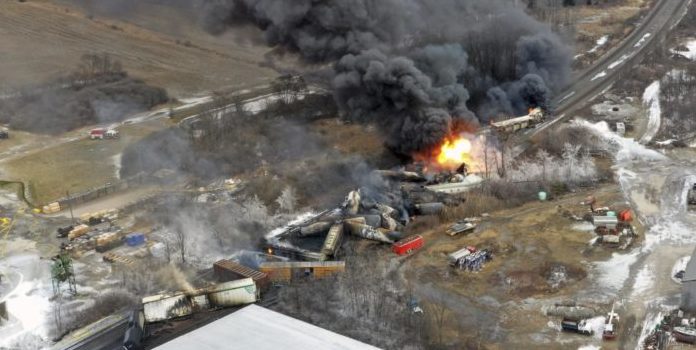(Ken Silva, Headline USA) Norfolk Southern’s half-baked plan to ignite chemicals released in its East Palestine, Ohio, train derailment was entirely unnecessary, as officials could have waited for the chemicals to cool down before removing them, according to National Transportation Safety Board Chair Jennifer Homendy.
Homendy testified to Congress on Wednesday, telling senators that Ohio officials didn’t have all the necessary information before allowing Norfolk Southern to ignite the chemicals in a “vent and burn.” Homendy said the Ohio officials, including Gov. Mike DeWine, weren’t told that the chemicals were cooling down.
“There was no justification to do a vent and burn,” Homendy said. “There was another option: let it cool down.”
That revelation from Homendy led to Sen. JD Vance, R-Ohio, and others to wonder whether Norfolk Southern ignited the chemicals just so it could move its freight more quickly.
🚨 In stunning exchange, NTSB chair told @JDVance1 Norfolk Southern not only ignored REPEATED warnings from owner of TOXIC vinyl chloride rail cars that it was UNNECESSARY TO DETONATE 5 cars over East Palestine—Norfolk hid this from @GovMikeDeWine & EP fire chief b4 detonation. pic.twitter.com/CRdrxlnDd0
— Status Coup News (@StatusCoup) March 7, 2024
“My criticism is of people on ground who provided inadequate information … this town may have been poisoned to facilitate the rapid movement of freight, or at the very least poisoned for reasons we can’t identify,” he said.
Sen. Sherrod Brown, D-Ohio, also expressed outrage over the matter following the hearing.
“This explosion — which devastated so many — was unnecessary. The people of East Palestine are still living with the consequences of this toxic burn. This is more proof that Norfolk Southern put profits over safety and cannot be trusted,” he said.
Homendy’s statements echoed that of top Ohio scientist Dr. David Manuta, who Headline USA interviewed last year in the wake of last February’s disaster.
At the time, Dr. Manuta also questioned the initial decision to conduct a “controlled release” of the vinyl chloride into prepared pits before burning it into the atmosphere. This decision produced phosgene gas, which was banned under the Geneva Convention after killing about 85,000 people in World War I.
While burning the 1 million-plus pounds of vinyl chloride may have been preferable to letting it seep into the ground, Manuta wonders why officials were so quick to opt for an open-air burn of all the chemicals at once. Giant tents or other enclosures over the burn pits—or over the train cars—could have captured at least some, if not the vast majority, of toxic plumes released into the air, he said at the time.
Norfolk Southern continues to face civil litigation over its poisoning of East Palestine.
Ken Silva is a staff writer at Headline USA. Follow him at twitter.com/jd_cashless.

